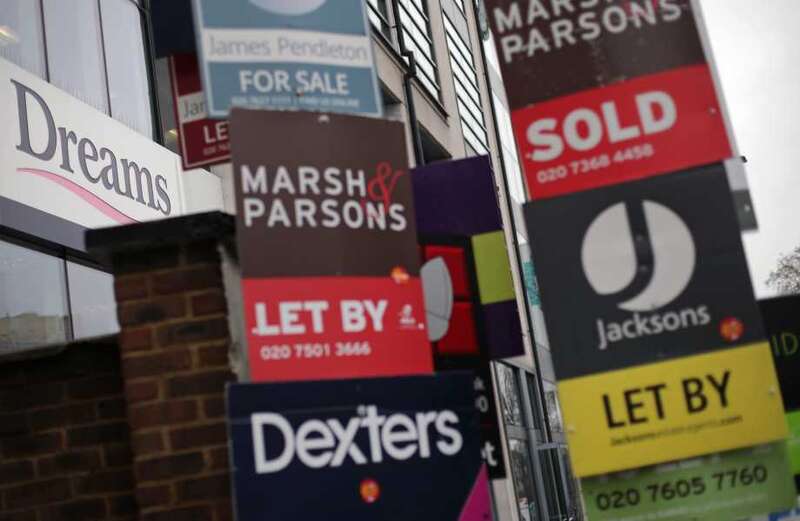HOUSE prices saw the largest annual fall for 14 years in May, slipping 3.4 per cent.
It is the biggest drop since July 2009, when they plunged 6.2 per cent in the wake of the banking crisis.

According to the Nationwide Building Society, the fall left the average house costing £260,736 — 4 per cent below the heights reached last August.
House price falls slowed to 0.1 per cent in May after a 0.4 per cent drop in April.
Robert Gardner, the building society’s chief economist, said: “Recent Bank of England data showed signs of recovery in the housing market.”
 From tongue scraping to saying no, here are 12 health trends to try in 2023
From tongue scraping to saying no, here are 12 health trends to try in 2023
But he predicted: “Headwinds look set to strengthen in the near term.”
However, he ruled out a housing crash, saying: “A relatively soft landing remains the most likely outcome since labour market conditions remain solid and household balance sheets appear in good shape.”
London estate agent Jeremy Leaf said: “Continuing worries about the cost of living are compromising confidence leading to a softening of property prices.”
Lower house prices would normally be encouraging for first-time buyers, but they have been hit by the cost of living crisis which has worsened mortgage cost and availability.
Bank of England figures showed the number of mortgage approvals fell to 48,700 in April from 51,500 in March.
Tomer Aboody, of MT Finance, said: “Lower mortgage approvals in April are disappointing, indicating less confidence in the market.”
Expectations remain that the base rate will climb to 5.5 per cent when the Bank of England makes its next interest rate decision later this month, pushing up mortgage interest rates.
Quilter mortgage expert Karen Noye said: “It means the outlook for the housing market is somewhat bleak as we head into summer.”
Royalties lift shops
THE King’s Coronation, bank holidays and Eurovision boosted retail sales in the first half of May by 5.9 per cent according to Mastercard.
High street sales climbed 7.2 per cent while online sales were down 1.6 per cent.
 How to de-clutter if you have a beauty stash to last you a lifetime
How to de-clutter if you have a beauty stash to last you a lifetime


Mastercard’s Natalia Lechmanova said: “Brits have been making the most of the Coronation weekend and consecutive May bank holidays.
The biggest increase came on May 5 — the day before the Coronation — when retail sales climbed 15.7 per cent compared with a year earlier as people snapped up groceries for family and community celebrations.
Diners choosing to eat out on the extra bank holiday of May 8 helped spending in restaurants climb 15.1 per cent on the day.
The Grand Final of the Eurovision Song Contest in Liverpool on May 13 helped sales in that city rise 6.8 per cent.
But Ms Lechmanova said spending on home- related durable goods including furniture, electronics and DIY is yet to get a similar boost.

4 month low for industry
THE UK manufacturing industry’s woes are deepening with activity falling to a four-month low in May.
That was because post-Brexit trade checks weakened overseas demand, according to the S&P Global/Cips UK Manufacturing Purchasing Managers’ Index survey.

It showed a reading of 47.1 in May, down from 47.8 in April, with anything below 50 a decline.
The sector has recorded a score below 50 for ten months in a row.
Rob Dobson, of S&P Global Market Intelligence, said: “New orders and employment are falling at increased rates.”
He said manufacturers are suffering from weak demand, client destocking and a general shift in spending in the UK away from goods to services.
However he said that despite near-term conditions remaining challenging, manufacturers are still finding reasons for optimism including brighter news on the price and supply fronts.
Alexa in £20m fine over kids
AMAZON has been fined £20million for violating child privacy with its Alexa voice assistant devices.
The online giant agreed to pay the US Federal Trade Commission after it was accused of failing to delete Alexa recordings at the request of parents.

The FTC accused the firm of “sacrificing privacy for profits”.
Amazon’s global revenues surged to a record high of £24billion last year — a £1billion year-on-year increase.
The company said it paid £781million in direct UK taxes last year — up £130million from the previous 12 months.
It has around 75,000 workers in the UK and more than 100 warehouses and offices.
It said it spent £1.6billion on UK investments including fitting warehouses with the latest robot technology and opening a development centre in Swansea, South Wales.
Amazon said it is proud of its “significant economic contribution to the UK economy”.
US blow hits Dr Martens
BOOTMAKER Dr Martens has said that profits fell 26 per cent to £159.4million last year after it made mistakes in its US expansion.
The company bungled a move of its main distribution centre on the US West Coast from Portland to Los Angeles — and then overstocked the new site.
The news sent Dr Martens’ shares tumbling more than 11 per cent.
But the company’s boss Kenny Wilson has said the problems are now fixed with the site now shipping twice as many pairs a day as it was in January.
Dr Martens is now selling more of its classic boots direct to consumers, the company said, increasing from 49 per cent to 52 per cent.


































